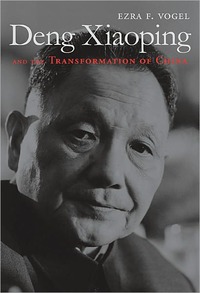

Purchase
Deng Xiaoping And The Transformation Of China
Ezra F. Vogel
Harvard University Press
October 2011
On Sale: September 26, 2011
928 pages
ISBN: 0674055446
EAN: 9780674055445
Kindle: B0064EHZY0
Hardcover / e-Book
Add to Wish List
Non-Fiction Biography
Perhaps no one in the twentieth century had a greater
long-term impact on world history than Deng Xiaoping. And no
scholar of contemporary East Asian history and culture is
better qualified than Ezra Vogel to disentangle the many
contradictions embodied in the life and legacy of China’s
boldest strategist. Once described by Mao Zedong as a
“needle inside a ball of cotton,” Deng was the pragmatic yet
disciplined driving force behind China’s radical
transformation in the late twentieth century. He confronted
the damage wrought by the Cultural Revolution, dissolved
Mao’s cult of personality, and loosened the economic and
social policies that had stunted China’s growth. Obsessed
with modernization and technology, Deng opened trade
relations with the West that lifted hundreds of millions of
his countrymen out of poverty. Yet at the same time he
answered to his authoritarian roots, most notably when he
ordered the crackdown in June 1989 at Tiananmen
Square. Deng’s youthful commitment to the Communist
Party was cemented in Paris in the early 1920s, among a
group of Chinese student-workers that also included Zhou
Enlai. Deng returned home in 1927 to join the Chinese
Revolution on the ground floor. In the fifty years of his
tumultuous rise to power, he endured accusations, purges,
and even exile before becoming China’s preeminent leader
from 1978 to 1989 and again in 1992. When he reached the
top, Deng saw an opportunity to creatively destroy much of
the economic system he had helped build for five decades as
a loyal follower of Mao—and he did not hesitate.
Comments
No comments posted.
Registered users may leave comments.
Log in or register now!
| 


 © 2003-2024 off-the-edge.net
all rights reserved Privacy Policy
© 2003-2024 off-the-edge.net
all rights reserved Privacy Policy